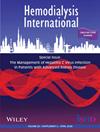Effect of vitamin D supplementation on management of anemia in hemodialysis patients with vitamin D deficiency: A double-blind, randomized, controlled trial
Abstract
Introduction
Anemia and vitamin D deficiency are common problems among hemodialysis (HD) patients. This study aimed to assess the impact of correction of vitamin D deficiency with vitamin D supplementation on the improvement of anemia in patients with end-stage renal disease (ESRD) on maintenance HD.
Methods
This double-blind, randomized, controlled study included 100 anemic HD patients with vitamin D deficiency who were randomly divided using the closed envelop method into two groups (1:1). The first group received vitamin D (50,000 IU) monthly for 6 months, and the other group received a placebo for the same period. 25-Hydroxyvitamin D (25(OH)D) levels were measured for both groups at the beginning of the study and after 6 months at the end of the study. Hemoglobin (Hb) concentrations were recorded monthly.
Findings
Vitamin D supplementation during the period of the study increased 25(OH)D levels in the vitamin D group more than the placebo group (p > 0.001). Serum ferritin, serum iron, and transferrin saturation did not differ significantly between both groups during the period of the study. Hb concentration in the vitamin D group increased more than that in the other group over the period of the study, and there was a statistically significant difference between the two groups in all durations of follow-up. Erythropoietin (EPO) dosage requirements were found to be lower in the vitamin D group than in the placebo group, and this was statistically significant (p > 0.001).
Discussion
Vitamin D supplementation in anemic ESRD patients on HD with vitamin D deficiency or insufficiency is safe and effective in improving anemia and decreasing EPO dosage.

 求助内容:
求助内容: 应助结果提醒方式:
应助结果提醒方式:


